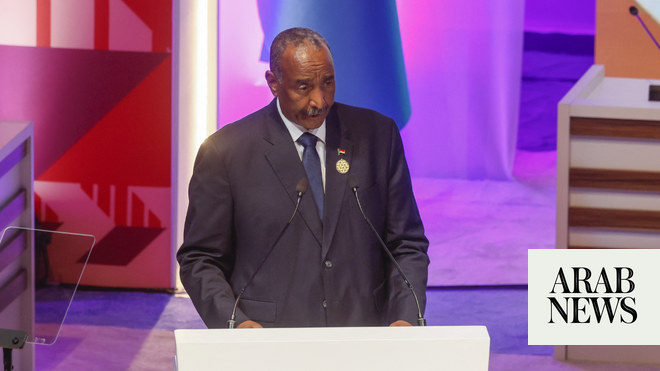
Sudan"s long-running economic crisis had shown signs of abating before the coup
Military leaders have yet to name a prime minister and protests have raged for months
KHARTOUM: Sudan is once again lurching toward economic collapse in the aftermath of a coup in October, with exports plummeting more than 85 percent in January according to central bank data and the currency sliding on the black market.
Cut off from billions in foreign assistance, a military-led government is raising prices and taxes on everything from health care to cooking gas, but the increases have angered struggling citizens.
Sudan’s long-running economic crisis — a legacy of decades of war, isolation, and sanctions — had shown signs of abating before the coup, but now poses a fresh humanitarian risk as its population faces renewed violence and rising levels of hunger.
Military leaders have yet to name a prime minister and protests have raged for months. The political deadlock is paralysing business, said Amin Shibeika, a Khartoum banker.
“No one is making future plans, it’s all suspended. There’s a lack of transparency, with no light at the end of the tunnel,” he said.
The Oct. 25 coup ended a power-sharing agreement between the military and civilians struck after the overthrow of former leader Omar Al-Bashir in a 2019 uprising. Designed to lead to democratic elections, it had seen a civilian government implement painful economic reforms and secure foreign assistance and debt relief. That is now frozen.
In the latest effort by the leadership to rally scarce international support, Mohamed Hamdan Dagalo, deputy leader of Sudan’s ruling council and commander of the paramilitary Rapid Support Forces, traveled to Moscow last week accompanied by finance minister and armed group leader Jibril Ibrahim.
While the delegation met senior figures including Foreign Minister Sergei Lavrov, no major deals have been announced and Russia itself is now facing sweeping Western sanctions over the invasion of Ukraine.
NO BAILOUT IN SIGHT
A senior Sudanese official said the government saw no foreign bailout on the horizon, and Ibrahim has said Sudan would rely on its own resources for this year’s budget.
According to a copy of the draft budget seen by Reuters, it is aiming for a 145 percent increase in tax revenues and a 140 percent increase in revenue from the sale of commodities and services.
Among the tax measures to achieve that is what traders say is a four- or five-fold increase on annual business license fees. But businesses are so used to not paying taxes that increases would be hard to impose, said Shibeika, the banker.
“Business has basically stopped in the last few months, so these are additional burdens in difficult circumstances,” said a business owner in central Khartoum. “This is the worst it’s been since I started trading 20 years ago.”
Revenues and spending are forecast to rise by more than a third, with a deficit of 363 billion Sudanese pounds ($820 million).
Though the government has ratified the budget, a senior finance ministry official said it was not realistic and not being applied on the ground.
Analysts say it would not be possible to pay salaries and meet other expenditures without resorting to inflationary printing of money, which Ibrahim last week denied doing.
The finance ministry did not respond to a request for comment.
’WE DON’T HAVE THE MONEY’
A weeks-long blockade of Port Sudan prior to the coup and barricades along a trade route with Egypt by anti-military protesters have restricted exports of goods such as sesame seeds, peanuts, cotton and gum Arabic that bring in badly needed dollars.
In January, Sudan exported only $43.5 million worth of goods, down sharply from $293 million in December, according to central bank data seen by Reuters, although this is a peak agricultural export season.
Following the devaluation of Sudan’s currency a year ago, the exchange rate had stabilized at about 450 pounds to the dollar. But in recent weeks the black market has resurfaced and the pound was changing hands at 530 against the dollar on Wednesday, compared with an official rate of 443.50.
Dollar auction results show the central bank has been selling lower quantities, hinting at depleted reserves. Inflation has eased slightly, but remains at one of the highest rates globally at 260 percent in January.
Prices for petrol and electricity have risen following global trends after subsidy reforms, as has the cost of government-issued paperwork and subsidised cooking gas.
In a move that was subsequently suspended, the cost of patient admissions at state health care facilities went from 250 pounds to 4,200 overnight last month, said Ali Shakir, head of one of the country’s largest public hospitals.
He said that while he had requested an increased budget, “we were surprised that they wanted us to take it from citizens’ pockets.”
Sudan’s ruling council said in a statement that prices would be reviewed and that the government did not consider health care a revenue earner.
But the rising costs could fuel further resentment over the kind of economic hardships that triggered the uprising against Bashir, including increasingly scarce subsidized bread.
“Life has become really, really terrible,” said Khartoum resident Amna of the time since the coup. “The bakery sells a piece of bread as big as a marble and say it’s 30 Sudanese pounds ($0.07). We don’t have the money for it.”












